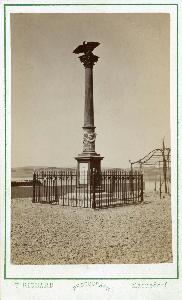Traugott Richard (Photographer)
Traugott Richard (Photographer);Traugott Richard
Place: Rapperswil
Born: 1835
Death: 1903
Biography:
Traugott Richard was a Swiss photographer born in Rapperswil in 1835 and died in 1903. He is known for his photograph Bar Column / Polish Freedom Column in Rapperswil taken in 1868, which showcases his exceptional skill in capturing the essence of his subjects.
Early Life and Career
Traugott Richard's life and career are not well-documented, but it is known that he was active as a photographer during the late 19th century. He was part of a generation of photographers who experimented with new techniques and technologies to produce high-quality images.
Photographic Style and Techniques
Traugott Richard's photographic style is characterized by his use of photogravure, a photo-mechanical process that produces high-quality intaglio plates capable of reproducing detailed continuous tones of a photograph. This technique, developed in the 19th century by Nicéphore Niépce and Henry Fox Talbot, allowed photographers to mass-produce their images with great accuracy. Traugott Richard's work can be found in various museums and collections, including The Polish Museum in Rapperswil, which houses his famous photograph Bar Column / Polish Freedom Column in Rapperswil. This museum is dedicated to preserving the cultural heritage of Poland and Switzerland, and Traugott Richard's work is an important part of its collection.
Legacy and Impact
Traugott Richard's contribution to the world of photography is significant, and his work continues to inspire photographers and art lovers today. His use of photogravure and other techniques helped to establish photography as a legitimate art form, and his photographs remain an important part of Switzerland's cultural heritage. Some notable works by Traugott Richard can be found on Wikioo.org, including his photograph Bar Column / Polish Freedom Column in Rapperswil. This website is a valuable resource for art lovers and researchers, providing access to a wide range of artworks and information about artists like Traugott Richard.
- Museo Vela Ligornetto in Switzerland is another important cultural institution that showcases the work of Swiss artists, including Traugott Richard.
- The Polish Museum in Rapperswil is a significant repository of Polish and Swiss art, with a collection that includes works by Traugott Richard and other notable artists.
- Traugott Richard's work can also be found on Wikioo.org, which provides a comprehensive overview of his photographic career.
Traugott Richard's photography is an important part of Switzerland's cultural heritage, and his work continues to inspire art lovers and photographers today. His use of innovative techniques like photogravure helped to establish photography as a legitimate art form, and his photographs remain an essential part of our understanding of the world in the 19th century.

